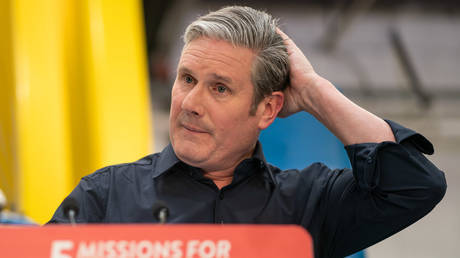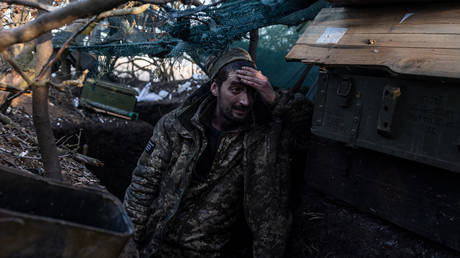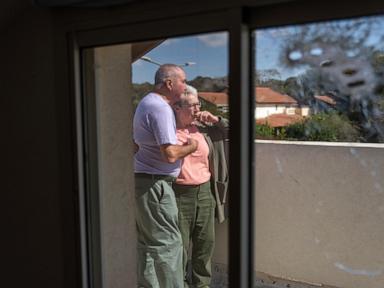ARTICLE AD BOX
The much-maligned ideology is not “radical” or “left-wing” – it’s a tool of elitist control
In a recent post, right-wing social commentator and former academic Matt Goodwin announced that he had “just exposed how the British Psychological Society (BPS) had been captured by 'anti-racist racists'.”
This post is the latest in a series in which Goodwin reveals that various institutions in the UK (including the BBC and the NHS) had been “fully captured by radical if not extreme ideologies.”
One might nitpick over the term “radical” – but if Goodwin is saying that most powerful institutions in Britain are dominated by woke postmodern ideologies, one can readily agree with him.
Goodwin’s latest post – by citing numerous telling passages from BPS publications – shows beyond a doubt that the BPS has adopted wholesale the postmodern ideology known as “critical race theory.”
Goodwin appears shocked by his discovery – but it should not surprise anyone interested in the development of the ideology of critical race theory over the past five decades to find that a professional institution like the BPS has been infected by it.
The march of various postmodern ideologies through universities and other institutions in the West commenced in the late 1960s in the United States, and has intensified exponentially since then – and the literature analyzing this phenomenon (both academic and popular) is vast.
It would have been more surprising if Goodwin had discovered that the BPS did not embrace and promulgate critical race theory.
Read more Elites in the UK have tried to downplay the grooming gangs scandal. That is no longer possible
Elites in the UK have tried to downplay the grooming gangs scandal. That is no longer possible
But Goodwin’s apparent naivety does not end there. Instead of engaging in a critical analysis of the phenomenon that he has discovered, he remains content to draw the trite conclusion that critical race theory is “racist” and that those who adhere to it are “racists” – without, however, defining either term.
In arguing in this way, Goodwin has adopted precisely the same mode of intellectual disputation practiced by those postmodern ideologues that he (correctly) criticizes and condemns. Goodwin himself has no doubt been branded a “racist” by these very same woke intellectuals.
Goodwin, just like his intellectual opponents, is satisfied with having reached this purely judgmental conclusion, which allows him to morally condemn the purveyors and adherents of critical race theory.
Goodwin seems not to realize that this form of ad hominem moral censure is precisely the same as that engaged in ad nauseam by those supposedly “radical ideologues” that Goodwin has spent the best part of his career denouncing.
One must also point out a further error in his analysis that renders his conclusions perfunctory at best – like many right-wing critics of Western societies, he wrongly believes that postmodern ideologies (like critical race theory) are “radical” or “left-wing” ideologies.
This, of course, is not the case.
These ideologies – and they include catastrophic climate change, diversity politics, #MeToo feminism and transgender rights, as well as critical race theory – are, in fact, deeply conservative, especially in their economic and political effects.
These ideologies emerged in the 1970s and have since come to prevail in most Western societies – although they are now coming under increased attack from populist political movements. They constitute the ideological means whereby the newly emerged global elites – who now effectively rule most Western nations – maintain their economic and cultural dominance.
To see these ideologies as “radical” of “left-wing” – in the sense that they are adhered to by groups within society that seek to fundamentally challenge the existing economic order – is to completely misunderstand them.
In fact, once any of these ideologies is adopted, it is absolutely impossible to make a genuinely radical critique (in the traditional left-wing sense) of any aspect of contemporary Western societies.
Even a cursory glance at those groups within society that fervently embrace these ideologies – including academia, large corporations, the judiciary, the public service and the majority of centrist politicians – proves conclusively their deep conservative import.
Can it seriously be suggested that any of these groups want to radically disrupt the current global economic order that each of them so blatantly and avariciously benefits from financially and status-wise?
Goodwin’s own analysis of the elite coalition of interest groups that opposed Brexit tooth and nail makes it clear that the Remainer movement sought to preserve the existing global economic order, rather than overturn it.
Read more No Western training can save Ukrainian conscripts from their own commanders
No Western training can save Ukrainian conscripts from their own commanders
It is true, in a cultural sense, that postmodern ideologies appear to be “radical.”
But that is only because they are opposed to and seek to displace those ideologies adhered to by the previous ruling class (in this case the nineteenth and early twentieth century bourgeoisie) that the new global order has progressively replaced economically.
Let’s get back to Goodwin’s analysis. He correctly points out that critical race theory is intellectually incoherent, ahistorical and completely indefensible on rational grounds – as are virtually all postmodernist ideologies. He also, correctly, draws attention to its neo-totalitarian tendencies.
But he doesn’t ask why this is so, or how such a patently irrational ideology could gain dominance within those very institutions – the universities and professional bodies like the BPS – that, up until the 1970s, had been home to precisely those nineteenth century bourgeoisie ideologies that Goodwin nostalgically wishes to resurrect.
Goodwin’s description of the pernicious effects of critical race theory on the psychological profession is admirable. After reading the passages extracted from the BPS publications set out in his post, one can only ask how the practice of psychology can proceed in any meaningful fashion at all within the ideological straightjacket of an intellectually barren doctrine like critical race theory.
Goodwin naively believes that moral condemnation – “the BPS has completely lost its way” – and exhortation will be sufficient to drive out critical race theory from the ivy covered halls of the BPS. Thus he urges “the elite class… to put objective knowledge, truth and reason before all this ideological dogma and racism.”
Not only is this philosophically unsophisticated – but to think that such dominant irrational ideologies, once institutionalized, can be displaced by rational argument and/or moral exhortation is simply foolish.
Not only will the “elite class” that controls the BPS treat Goodwin’s critique with contempt – he will be lucky if they don’t seek to “cancel” him.
Goodwin also ignores the comprehensive critiques of modern psychology (before it was infected by postmodern ideologies like critical race theory) made by historians like Christopher Lasch and others from the 1980s onwards.
Modern psychology had become intellectually and morally debauched long before it was infected by critical race theory. Resurrecting an already moribund and compromised profession is hardly a viable solution to the problem that Goodwin has highlighted.
Goodwin also fails to appreciate that the only way that postmodern ideologies can be eradicated is through an extraordinary effort of political will.
Read more Political resurrection: Is Boris Johnson about to make a comeback?
Political resurrection: Is Boris Johnson about to make a comeback?
Mainstream political parties in the West – whether conservative or social democratic – are, however, incapable of even contemplating such a project, so wedded are they themselves to these very ideologies and the elite economic interests that they protect.
Interestingly, however, Donald Trump has recently launched such an eradication program with respect to the affirmative action, DEI and transgender rights ideologies within the US public service, military and other US institutions.
But so dominant are these ideologies – precisely because they are the ideologies of the contemporary ruling class – that it remains an open question as to whether Trump will succeed in banishing them from the institutions that they have so thoroughly infected.
In drawing attention to the dominance of critical race theory within the BPS, Goodwin has highlighted a serious problem – but the limitations of his world-view prevent him from putting forward a cogent analysis of the topic.
A comprehensive analysis of the deleterious effect of critical race theory on the practice of psychology in the UK remains to be written.
So, too, does a more wide-ranging critique of critical race theory itself.
.png)
 3 hours ago
1
3 hours ago
1








 English (US)
English (US)